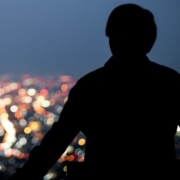Day 9: From Self-Preservation to Vulnerability
BY MAUREEN O’CONNELL, PH.D. | February 25, 2021
Today’s Readings

At a recent virtual program on anti-racism hosted by Cranaleith Spiritual Center, one of the four young panelists, an artist named Isaac Scott who co-designed the “Stay Golden” mural honoring the resilience of the African diaspora in Philadelphia, said something to the largely white participants about what anti-racism requires that still reverberates in me. When it comes to redemption for a people so divided and wounded by racism, Isaac recommended that we work to shift from self-preservation toward vulnerability. Self-preservation, he said, closes us off to our deepest selves and to each other. It leads to inflexibility and defensiveness. Vulnerability on the other hand softens us, opens us to different pathways forward.

[Image: Stay Golden, photo by Steve Weinik, 2020, via Isaac’s Pottery]
Yet there is vulnerability even in these texts about self-preservation. Both indicate that if we wish to preserve ourselves we must also risk caring deeply about others’ well-being and then act accordingly. Esther literally put her body on the line—prostrate on the ground before Yahweh and then face to face with the king—to advocate for her people. Jesus instructs us to knock on the door while also abiding by the “golden rule”: we must risk opening doors to others in order to have our own deepest needs met.
For Reflection:
- Where in your life are you Esther, whether at risk because of who you are, or what you hope to preserve, or your proximity to power?
- How can you relate to someone else today in a way that demonstrates communal preservation through vulnerability?

Maureen H. O’Connell is Associate Professor of Christian Ethics in the Department of Religion and Theology at La Salle University. She recently published Undoing the Knots: Five Generations of American Catholic Anti-Blackness with Beacon Press.
Maureen H. O’Connell es profesora asociada de ética cristiana en el departamento de religión y teología de la Universidad La Salle. Recientemente publicó Undoing the Knots: Five Generations of American Catholic Anti-Blackness con Beacon Press.









Thank you for this reminder that God created each of us to be in the world and be in community with each other. In order to do both of these things we must be vulnerable & open to God’s will for ourselves, the desires of our heart, AND the needs of others. That is a lot when our initial inclination is to withdraw from those things that require vulnerability.
I have felt called, like Ester, to protect others. As a University professor in a Catholic University I felt strongly about helping our students who were first generation college people by making sure they knew the direction they needed to follow. I did so but what happened was that I learned so much about generosity and kindness from them. When I explained to them that they were taking the wrong course for their major, they listened and followed the direction I gave them (well, for the most part). When they got their degrees they were ecstatic and appreciative. They have made a difference in our Church and our society by giving back what they received. The call to be Ester to others is such a wonderful gift and returns graces to those of us making sure they are protected.
Thank you for the lovely reflection. It helps me understand the internal cringe I feel at these words, “May the Body and Blood of Christ keep me safe for eternal life.” Discipleship, fully engaged, isn’t about safety (self-preservation). I have thought instead, “May the Body and Blood of Christ give me courage to have the heart of Christ.” After reading this, I think my revision still isn’t enough. Courage can’t hurt, but it isn’t the same as feeling one with my human family that is precariously vulnerable.
Getting on the front-foot is far better than going on the back-foot. Risk-taking can add life to our life spans.